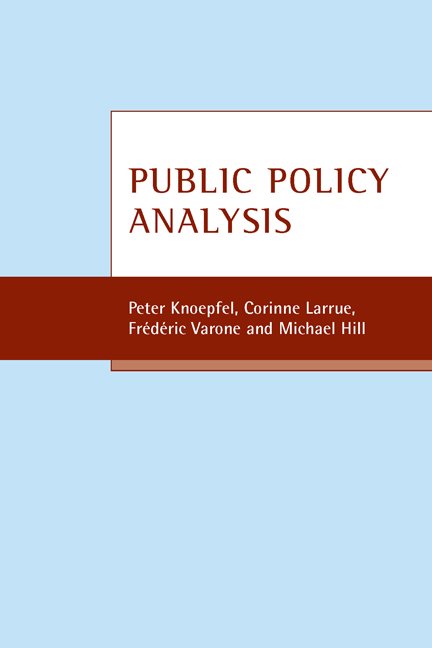one - Theoretical perspectives on policy analysis
Published online by Cambridge University Press: 14 January 2022
Summary
Policy analysis consists in the “study of the action of public authorities within society” (Mény and Thoenig, 1989, p 9). In terms of disciplines, a number of academic sectors have been and are associated with it. It was adopted as early as 1979 by Wildavsky (1979, p 15) in his plea for the development of this approach: “Policy analysis is an applied subfield whose contents cannot be determined by disciplinary boundaries but by whatever appears appropriate to the circumstances of the time and the nature of the problem”. Similarly, Muller (1990, p 3) mentions that “policy analysis is located at the junction of previously established knowledge from which it borrows its principal concepts”.
We start by presenting a quick review of the literature from the traditional policy analysis schools1 and then go on to examine the specific theoretical framework adopted in this book.
1.1 Various currents in policy analysis
The main disciplines that can be observed within the different schools define themselves in accordance with the theoretical and normative perspectives, on which the positions of the different authors are based and/or towards which they tend. Thus, after Mény and Thoenig (1989) and Muller (1990, p 3), it is possible to identify three major currents in policy analysis that reflect different aims without, however, being mutually exclusive. These currents differ mainly in terms of their focuses on specific fields of analysis.
Thus, we make distinctions between a first school of thought that associates policy analysis and the theory of state, a second that explains the way in which public action works and, finally, a third that focuses on the evaluation of the results and effects of the latter.
1.1.1 Policy analysis based on the theories of state
For the first group of authors, policy analysis is a means of explaining the actual essence of public action because policies are interpreted as revealing its nature. This current, which the political sciences dominates and lays claim to, in France in particular, attempts to link the policy approach with political philosophy and major questions concerning the theory of state. Thus, Mény and Thoenig (1989) define their approach in terms of a contribution to questions concerning ‘the emergence and nature of the state’ or to ‘the essence of politics’.
- Type
- Chapter
- Information
- Public Policy Analysis , pp. 3 - 16Publisher: Bristol University PressPrint publication year: 2007



